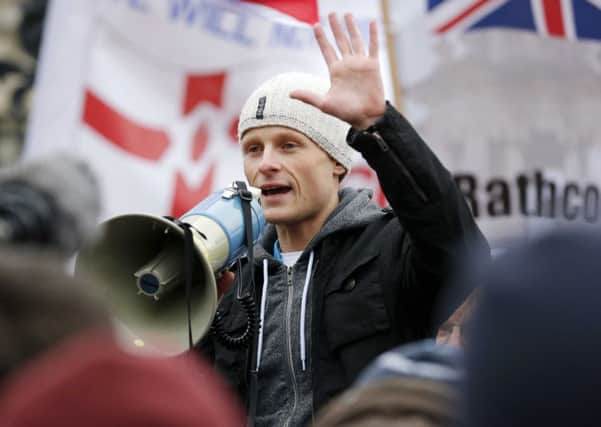The flag protests are over, time for a new strategy - Jamie Bryson


On Friday Mr Bryson said it was time to move on and adopt an updated strategy - but he faced extensive ridicule from working class unionists.
In December 2012 loyalists came out onto the streets after Belfast City Council voted to stop flying the Union Flag daily from City Hall. Thousands flooded the streets in protest across Northern Ireland, where Mr Bryson became prominent in addressing rallies.
Advertisement
Hide AdAdvertisement
Hide AdOn Friday he said there were still some token protests at City Hall - but the time had come to change tack.
“I think people may articulate opposition now because it may be an emotional reaction but I think if somebody sits back, reflects in the cool light of day and assesses what I actually said they will see there is nothing they can argue with him about,” he told the News Letter.
“What is their strategy and vision? If their strategy is just stand at City Hall and hope for something to happen, nothing is ever going to happen. That is not proactive and that is not an effective strategy. You will still be standing there in fifty years. You need to change strategy and move things forward.
“I don’t see a strategic or political purpose in continuing on with a protest that isn’t achieving anything.”
Advertisement
Hide AdAdvertisement
Hide AdMr Bryson faced claims that he had betrayed the flag protesters on BBC Talkback and social media yesterday.
His new direction includes acting as campaign manager for Belfast DUP councillor Ruth Patterson in the forthcoming assembly elections, but he has not confirmed if he might stand himself in the future.
The blogger and Open University law undergraduate affirmed that he was “yery very proud” of the protests and that they were a “release valve” for loyalist feeling at the time.
“The mistake I made at the flag protests was that I gave a speech where I said I would be standing at City Hall until the day the flag went back up. And that was a naive political move on my part because I boxed myself off, I painted myself into a cul-de-sac and I now recognise that that was a silly thing to do.”
Advertisement
Hide AdAdvertisement
Hide AdAnd he insisted there was a missed opportunity afterwards to put a strategy in place. “A good, proper strategy could have converted all that energy, all of that positive energy into positive political action. Unfortunately that was a missed opportunity.”
Asked who should have led things on, he replied: “We should have”.
But he did not have any personal regrets.
“It would have been difficult for me to capitalise on anything because at the time I was on the most stringent bail conditions of anyone in the UK. I was not allowed a phone, not allowed to be with three or more people, under a 6pm curfew, was not allowed a land line or internet, was not allowed to have anyone go on the internet for me; I was practically under house arrest.”
But the problem of non-voting working class unionists persists.
“That is why it is difficult to affect political change.”
‘Cause of protests still valid’
Advertisement
Hide AdAdvertisement
Hide AdThe root causes of the flag protests, Jamie Bryson believes, remain unresolved.
“There was a pressure cooker building in the unionist community where people felt disenfranchised from the peace process,” he said. “I think the two major unionist parties had gone too far”.
Peter Robinson was in a position of strength in 2011, he said.
“It seemed to a lot of people in our community that what Sinn Fein wanted, Sinn Fein got and that was building in terms of parades restrictions, with the flag issue the straw that broke the camel’s back.
Advertisement
Hide AdAdvertisement
Hide Ad“In terms of the police and justice strategy, there was a feeling that there was a two-tier policing strategy - and I still have that feeling - whereby the unionist community are treated entirely differently than the nationalist community.” The protests “put the brakes” on unionists in the Haass talks, he said.